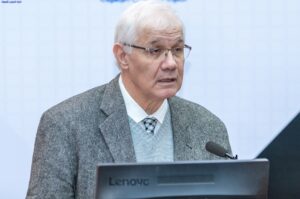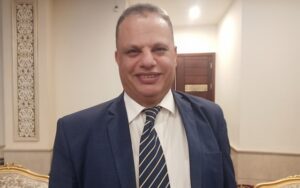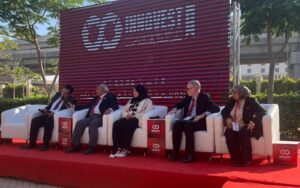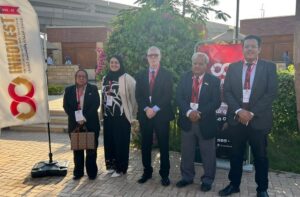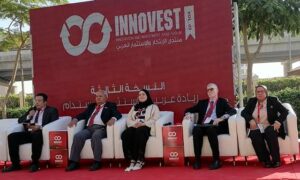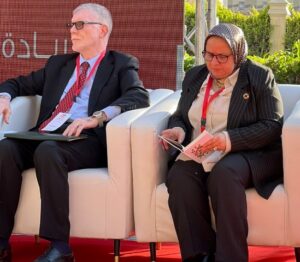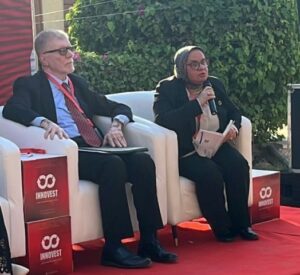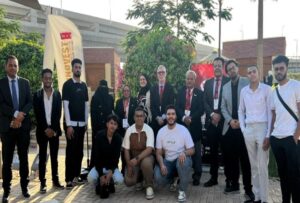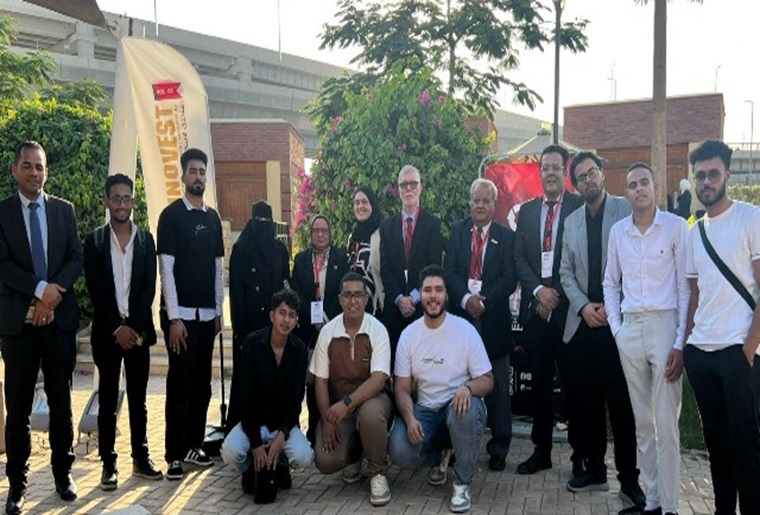The Egyptian Russian University Participates in the Arab Innovation and Investment Forum and Presents a vision for localizing sustainability
Dr. Sherif Fakhry Mohamed Abdel Nabi, President of the Egyptian Russian University, announced that the university participated in the activities of the Arab Innovation and Investment Forum, organized by the General Secretariat of the League of Arab States, Sustainable Development Department, Economic Affairs Sector, Economic Relations Department, in cooperation with the Qaderoon Youth Foundation for Sustainable Development, in Cairo under the slogan: “Arab Leadership… Sustainable Investment.” He noted that the university’s participation was sponsored by Dr. Mohamed Kamal Mustafa, Chairman of the University’s Board of Trustees.
In the same context, Dr. Hesham Fathy, Dean of the College of Artificial Intelligence at the Egyptian Russian University, noted that the university participated in a dialogue seminar entitled “Education, a Gateway to Localizing Sustainability.” Dr. Saeed Hassan Ibrahim, Vice Dean of the College of Artificial Intelligence at the university, delivered a speech titled “Integrating Artificial Intelligence with Sustainable Development Goals in Universities.” During the speech, he presented the Egyptian Russian University’s vision on: How can artificial intelligence specializations integrate with the Sustainable Development Goals in universities? What is missing from Egypt’s educational system to enhance this integration? Is there a legislative role that should be activated to support this trend?
For his part, Dr. Saeed Hassan Ibrahim, Vice Dean of the Faculty of Artificial Intelligence at the Russian Egyptian University, stated that the university’s presentation during the symposium included four main themes:
● The first theme: Integrating artificial intelligence with the Sustainable Development Goals (SDGs). The role of artificial intelligence as a strategic tool for developing education, scientific research, and community service was reviewed, highlighting AI applications such as machine learning, computer vision, and natural language processing, and their role in achieving goals such as good health, smart agriculture, quality education, and efficient use of resources. In addition, the conference will present models of successful university projects at the Egyptian-Russian University, Cairo University, Ain Shams University, and the Institute of Information and Technology. Recommendations include: integrating “Artificial Intelligence for Development” courses as mandatory or elective courses within all academic programs; establishing specialized research units within the university to study and apply artificial intelligence to achieve sustainable development goals; building partnerships between the faculties of Artificial Intelligence, Agriculture, Medicine, Economics, and Environmental Engineering to implement research and applied projects that serve the community; and encouraging students to implement graduation projects with a real developmental impact using artificial intelligence tools.
● The second theme: Gaps in the educational system, where the current reality was diagnosed, and gaps were identified, such as: “weak institutional awareness of the importance of integration, lack of multidisciplinary applied curricula, lack of community partnerships and qualified personnel, and presenting corrective proposals that include: Incorporating multidisciplinary curricula: by designing new courses such as “Artificial Intelligence for Development”, in which professors from different specializations participate, encouraging applied graduation projects by supporting student projects that simulate real-life issues using artificial intelligence, such as: “energy management on campus, improving air quality, monitoring the quality of education, building strategic partnerships through cooperation with relevant parties “ministries, international organizations, technology companies”; to implement joint projects and train staff, launch university incubators for sustainable innovation: by establishing university units aimed at developing AI-based solutions to serve local and regional sustainable development goals. Raise the efficiency of faculty members by organizing training workshops on the use of AI to solve development problems, in addition to sending members from non-technical colleges, such as colleges of management, law, and education, for training in specialized AI fields. Allocate sustainable funding by establishing an internal fund to support applied research intertwining AI and sustainable development.
● The third theme: The legislative dimension, where the Vice Dean of the College of Artificial Intelligence at the Russian Egyptian University confirmed that the current legislative framework does not adequately support the establishment of interdisciplinary programs or the financing of development projects in the field of artificial intelligence. In addition, the quality standards and institutional and programmatic accreditation for higher education institutions do not include indicators that measure the digital or environmental impact of academic outcomes. Corrective measures and legislative recommendations were presented, including amending the Higher Education Law to oblige colleges to include courses on artificial intelligence and sustainable development, and allowing interdisciplinary postgraduate programs. In scientific research policies, incentive funding should be allocated for applied projects related to artificial intelligence and development, and in government funding programs, national initiatives should be launched such as “Artificial Intelligence for Egypt 2030.” In international cooperation, facilitating the hosting of international projects and linking universities to major global initiatives should be facilitated. In quality and accreditation standards for higher education institutions and programs, new indicators should be introduced related to “digital sustainability” and “the percentage of multidisciplinary courses.” Work should also be done on a system of key performance indicators (KPIs) with the development of key performance indicators related to sustainable development.
● Fourth theme: A message to decision-makers. Dr. Saeed Hassan Ibrahim addressed decision-makers in the Ministries of Higher Education, Scientific Research, Planning, Communications, and Environment, stating that in the midst of the increasing challenges facing our societies, it has become imperative to recognize that digital transformation is no longer an option, but rather a national and societal necessity. He emphasized that sustainable development will not be achieved with traditional tools or fragmented approaches, and that artificial intelligence is the locomotive capable of pulling the development train towards a smarter and more equitable future.
The Vice Dean of the College of Artificial Intelligence at the Egyptian Russian University called for the adoption of a unified national vision that explicitly stipulates the need to integrate artificial intelligence as a key tool in achieving sustainable development goals within and outside universities. This vision should also encourage universities to graduate new generations of students who combine technical knowledge with a sense of social responsibility, as well as artificial intelligence tools and a sustainability mindset. This vision should also open the way for academics to actively participate in formulating educational and legislative policies, ensuring they are consistent with contemporary developments and real-world needs.
In concluding his speech, the Vice Dean of the College of Artificial Intelligence stated that if we aspire to a smart, sustainable, and comprehensive future, we must start with universities. They are no longer merely laboratories for knowledge production. Today, they are required to be platforms for reform, incubators for change, and engines of true societal and developmental transformation. Hence, the urgent need to shift toward “fifth-generation universities” becomes clear. These universities employ artificial intelligence, integrate sustainable development goals into their core strategic objectives, embrace innovation, and build strong bridges between education, research, society, and the economy.
It is worth noting that the forum aimed to support the innovation and startup ecosystem by presenting ideas to investors and major companies. It included panel discussions, interactive workshops, an innovation and startup exhibition, and live student project presentations. Official delegations from eight countries, more than 1,750 students, and a select group of experts, investors, and entrepreneurs from various sectors attended the forum.
The forum included panel discussions, interactive workshops, and an innovation and startup projects exhibition.
